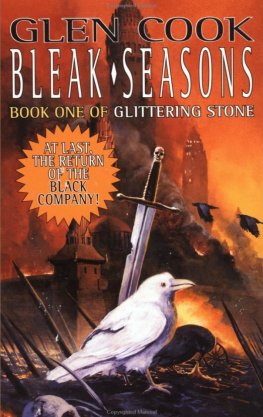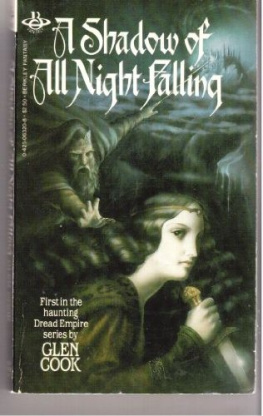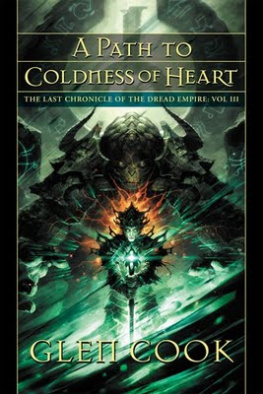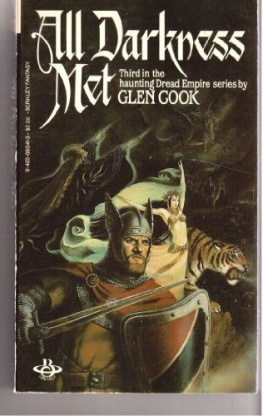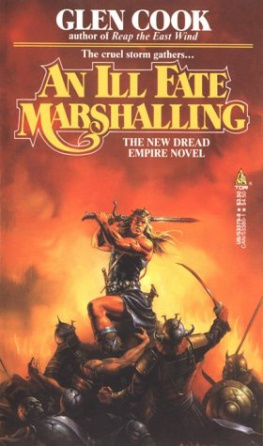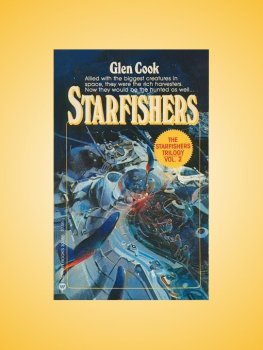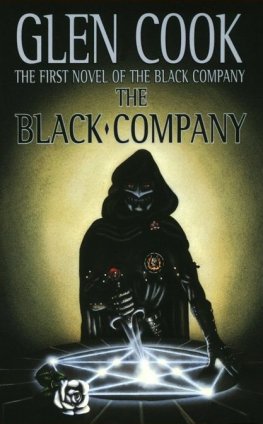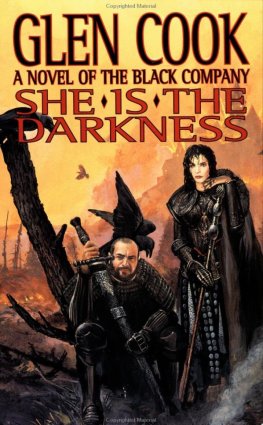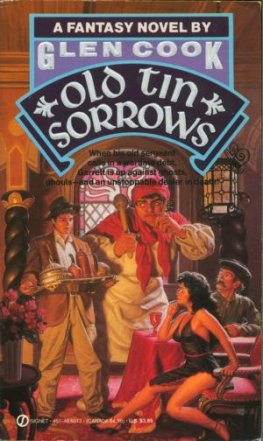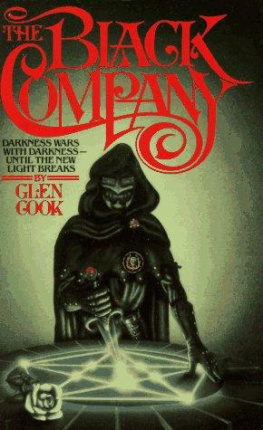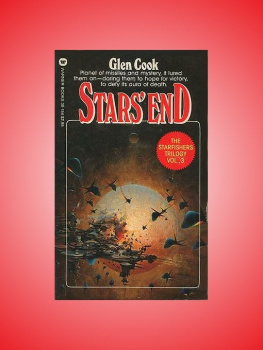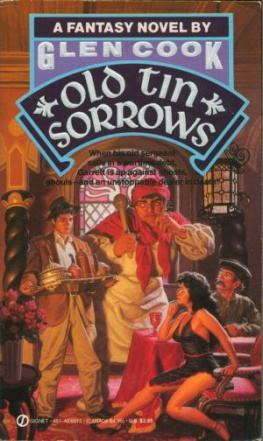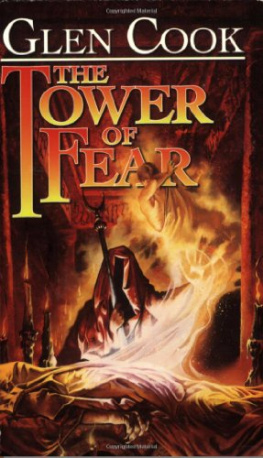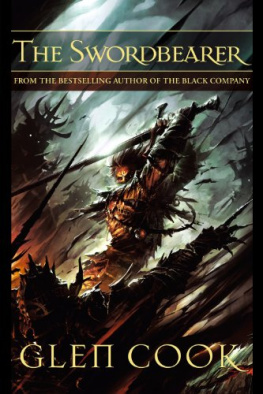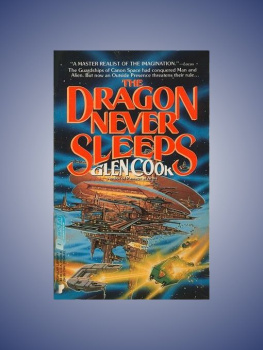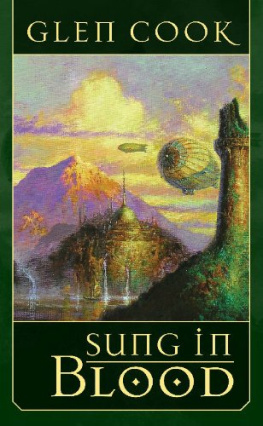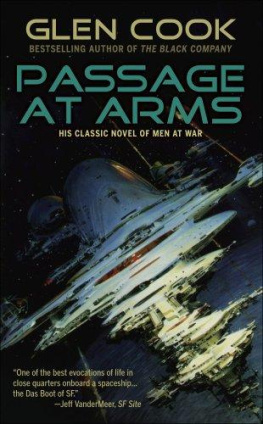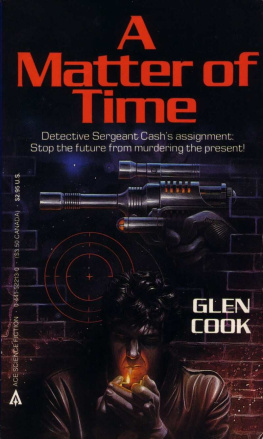Glen Cook - Splinter Of The Mind's Eye
Here you can read online Glen Cook - Splinter Of The Mind's Eye full text of the book (entire story) in english for free. Download pdf and epub, get meaning, cover and reviews about this ebook. genre: Romance novel. Description of the work, (preface) as well as reviews are available. Best literature library LitArk.com created for fans of good reading and offers a wide selection of genres:
Romance novel
Science fiction
Adventure
Detective
Science
History
Home and family
Prose
Art
Politics
Computer
Non-fiction
Religion
Business
Children
Humor
Choose a favorite category and find really read worthwhile books. Enjoy immersion in the world of imagination, feel the emotions of the characters or learn something new for yourself, make an fascinating discovery.

- Book:Splinter Of The Mind's Eye
- Author:
- Genre:
- Rating:3 / 5
- Favourites:Add to favourites
- Your mark:
- 60
- 1
- 2
- 3
- 4
- 5
Splinter Of The Mind's Eye: summary, description and annotation
We offer to read an annotation, description, summary or preface (depends on what the author of the book "Splinter Of The Mind's Eye" wrote himself). If you haven't found the necessary information about the book — write in the comments, we will try to find it.
Splinter Of The Mind's Eye — read online for free the complete book (whole text) full work
Below is the text of the book, divided by pages. System saving the place of the last page read, allows you to conveniently read the book "Splinter Of The Mind's Eye" online for free, without having to search again every time where you left off. Put a bookmark, and you can go to the page where you finished reading at any time.
Font size:
Interval:
Bookmark:
Glen Cook
Splinter Of The Mind's Eye
Chapter One
Making of a Messiah
T he caravan crept across a stony wadi and meandered upward into the hills. The camels boredly tramped out their graceless steps, defining the milemarks of their lives. Twelve tired beasts and six weary men made up the small, exhausted caravan.
They were nearing the end of their route. After a rest at El Aquila they would recross the Sahel for more salt.
Nine watchers awaited them.
The camels now carried the sweet dates, emeralds of Jebal al Alf Dhulquarneni, and imperial relics coveted by the traders of Hellin Daimiel. The traders would purchase them with salt recovered from the distant western sea.
An elderly merchant named Sidi al Rhami mastered the caravan. He was captain of a family enterprise. His companions were brothers and cousins and sons. His youngest boy, Micah, just twelve, was making his first transit of the family route.
The watchers didn't care who they were.
Their captain assigned victims. His men stirred uncomfortably in the shimmering heat. The sun's full might blasted down upon them. It was the hottest day in the hottest summer in living memory.
The camels plodded into the deathtrap defile.
The bandits leapt from the rocks. They howled like jackals.
Micah fell instantly, his skull cracked. His ears moaned with the force of the blow. He hardly had time to realize what was happening.
Everywhere the caravan had traveled men had remarked that it was a summer of evil. Never had the sun been so blistering, nor the oases so dry.
It was a summer of evil indeed when men sank to robbing salt merchants. Ancient law and custom decreed them free even of the predations of tax collectors, those bandits legitimized by stealing for the king.
Micah recovered consciousness several hours later. He immediately wished that he had died too. The pain he could endure. He was a child of Hammad al Nakir. The children of the Desert of Death hardened in a fiery furnace.
Plain impotence brought the death wish upon him.
He could not intimidate the vultures. He was too weak. He sat and wept while they and the jackals tore the flesh of his kinsmen and squabbled over delicacies.
Nine men and a camel had perished. The boy was a damned poor bet. His vision doubled and his ears rang whenever he moved. Sometimes he thought he heard voices calling. He ignored everything and stubbornly stumbled toward El Aquila in exhausting little odysseys of a hundred yards.
He kept passing out.
The fifth or sixth time he wakened in a low cave that stank of fox. Pain lanced from temple to temple. He had suffered headaches all his life, but never one as unremitting as this. He moaned. It became a plaintive whine.
"Ah. You're awake. Good. Here. Drink this."
Something that might have been a small, very old man crouched in a deep shadow. A wrinkled hand proffered a tin cup. Its bottom was barely wet with some dark, fragrant liquid.
Micah drained it. Oblivion returned.
Yet he heard a distant voice droning endlessly of faith, God, and the manifest destiny of the children of Hammad al Nakir.
The angel nurtured him for weeks. And droned unceasing litanies of jihad. Sometimes, on moonless nights, he took Micah aboard his winged horse and showed him the wide earth. Argon. Itaskia. Hellin Daimiel. Gog-Ahlan, the fallen. Dunno Scuttari. Necremnos. Throyes. Freyland. Hammad al Nakir itself, the Lesser Kingdoms, and so much more. And the angel repeatedly told him that these lands must again bend the knee to God, as they had done in the day of Empire. God, the eternal, was patient. God was just. God was understanding. And God was distressed by the backsliding of his Chosen. They were no longer bearing the Truth to the nations.
The angel would answer no questions. He merely castigated the children of Hammad al Nakir for having allowed the minions of the Dark One to blunt their will to carry the Truth.
Four centuries before the birth of Micah al Rhami there was a city, Ilkazar, which established dominion over all the west. But its kings were cruel, and too often swayed by the whims of sorcerers interested only in advancing themselves.
An ancient prophecy haunted the wizards of Ilkazar. It declared that the Empire's doom would find it through the agency of a woman. So those grim necromancers persecuted women of Power without mercy.
In the reign of Vilis, the final Emperor, a woman named Smyrena was burned.
She left a son. He persecutors overlooked the child.
That son migrated to Shinsan. He studied with the Tervola and Princes Thaumaturge of the Dread Empire. And then he returned, embittered with the bile of vengeance.
He was a mighty wizard now. He rallied the Empire's foes to his standard. The war was the cruelest that earth remembered. The wizards of Ilkazar were mighty too. The Empire's captains and soldiers were faithful, hardened men. Sorceries stalked the endless nights and devoured nations entire.
The heart of the Empire, then, was rich and fertile. The war left the land a vast, stony plain. The beds of great rivers became channels of lifeless sand. The land earned the name Hammad al Nakir, Desert of Death. The descendants of kings became petty hetmen of tattered bands which perpetrated bloody little butcheries upon one another over mudhole excuses for oases.
One family, the Quesani, established a nominal suzerainty over the desert, bringing an uneasy, oft broken peace. Semi-pacified, the tribes began raising small settlements and refurbishing old shrines.
They were a religious people, the Children of Hammad al Nakir. Only faith that their trials were the will of God gave them the endurance to weather the desert and the savagery of their cousins. Only an unshakable conviction that God would someday relent and restore them to their rightful place among the nations kept them battling.
But the religion of their Imperial forebears was sedentary, a faith for farmers and city dwellers. The theological hierarchies did not fall with the temporal. As generations passed and the Lord did not relent, common folk drifted ever farther from a priesthood unable to shed historical inertia, unable to adapt dogma to the circumstances of a people gone wholly nomadic and grown accustomed to weighing everything in the balance scale of death.
The summer had been the hardest since those immediately following the Fall. Autumn promised no relief. Oases were drying up. Order had begun to evade the grasp of Crown and priesthood. Chaos threatened as desperate men resorted to raid and counterraid and younger priests split with their elders over the meaning of the drought. Undisciplined anger stalked the barren hills and dunes. Dissatisfaction lurked in every shadow.
The land was harkening for the whisper of a new wind. One old man heard a sound. His response would damn and saint him.
Ridyah Imam al Assad's best days were far behind him. He was nearly blind now, after more than fifty years in the priesthood. There was little he could do to serve the Lord any longer. Now the Lord's own must care for him.
Nevertheless, they had given him a sword and set him to guard this slope. He had neither the strength nor the will to employ the weapon. If one of the el Habib came this way, to steal water from the springs and cisterns of Al Ghabha, he would do nothing. He had his weak sight to plead before his superiors.
The old man was true to his faith. He believed that he was but one brother in the Land of Peace and that such good fortune as came his way should be shared with those whom the Lord had called him to guide.
The Al Ghabha Shrine had water. El Aquila had none. He did not understand why his superiors were willing to bare steel to maintain that unnatural balance.
El Aquila lay to his left, a mile away. The squalid village was the headquarters of the el Habib tribe. The Shrine and the monastery where al Assad lived rose two hundred yards behind him. The monastery was the retirement home of the priests of the western desert.
Font size:
Interval:
Bookmark:
Similar books «Splinter Of The Mind's Eye»
Look at similar books to Splinter Of The Mind's Eye. We have selected literature similar in name and meaning in the hope of providing readers with more options to find new, interesting, not yet read works.
Discussion, reviews of the book Splinter Of The Mind's Eye and just readers' own opinions. Leave your comments, write what you think about the work, its meaning or the main characters. Specify what exactly you liked and what you didn't like, and why you think so.

